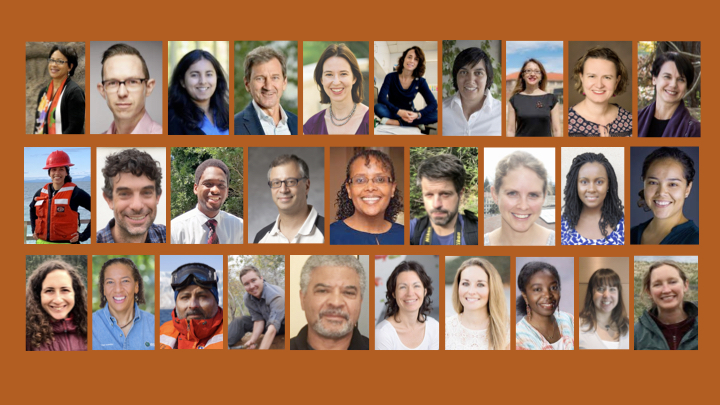Expanding Expertise: A Virtual De Ford Series Focuses on Diversity
August 18, 2021
During the last academic year, the De Ford Lecture Series—the signature seminar series in UT Austin’s Department of Geosciences — brought new research to a broader community through two major changes: thoughtful coordination by faculty to diversify the speakers and topics, and technology that delivered content to more people.
The De Ford Lectures are seminars that take center stage in the department most Thursday afternoons. While talks now highlight cutting edge research by geoscientists who traverse the globe, the forum started about 80 years ago as a way for graduate students to present their work. This series is funded by a series of endowments, and this year the over 25 talks were bookended by two prominent scientists, Lisa White, assistant director of the University of California Museum of Paleontology, who spoke about linking social justice to exhibits, and Dawn Wright, chief scientist at ESRI, who spoke about mapping and modeling the seafloor.

For the last five years, associate professor Liz Catlos has organized the list of speakers.
“I am more of a coordinator,” said Catlos. “The list of each year’s potential lecturers is really a grass-root effort involving proposals from all faculty.”
Coordinator or leader, the De Ford series under Catlos has become a showcase of diversity in research, in ideas, and in the geoscientists themselves. Over the last few years, nearly half of the lectures have been by female researchers. Much of this evolution was enabled after discussions with Sam Moore, the school’s former Director of Outreach and Diversity, and Sharon Mosher, former Dean of the Jackson School, who worked with Catlos and others to find speakers within the restrictions of the endowments that fund the series. Charlie Kerans, former department head, also played a role in the oversight for the endowment of the lecture series.
And during 2020-21, as both White and Wright’s lectures attest, the focus switched to increasing the racial diversity of speakers as well.
“Diversifying the series has been a departmental effort, and this year’s cohort is the most diverse I have seen,” said Catlos. She smiles as she continues. “When I first started managing the series, I did not get one woman proposed as a speaker. I went back to the faculty, saying, ‘Can we rethink the proposed speakers to include diverse speakers and more female representation?’ The situation entirely changed, and the last year was our more diverse speaker series since I had been part of the DeFord.”
In addition to diversity of speakers, the research presented last year also represented a diversity of approaches and fields. For example, climate change was tackled by several talks including one on extreme events by ETH Zurich’s Sonia Seneviratne, carbon capture by BP’s Chris Walker, global energy poverty by Bureau of Economic Geology’s Scott Tinker, and soils as carbon sinks by University of California Merced’s Asmeret Asefaw Berhe. There were also a number of excellent talks on hydrology, including presentations on the watershed of the Eel River by Tulane University’s Nicole Gasparini and nutrients in coastal freshwater by West Virginia University’s Deon Knights.
This list of talks above—with hyperlinks to recordings of each presentation—leads to the second major change in the 2020-21 De Ford Lecture Series: all of these talks were presented virtually, over Zoom. The COVID-19 pandemic forced a shift on campus to online education which in turn opened the seminars to people who typically could not sit in a lecture hall on campus at 4pm each Thursday could attend. And for those who could not tune in from afar, recordings are archived on the Jackson School’s YouTube channel where many presentations have had hundreds of views.
“While we could not meet in person for cookies or post-talk chatting, I found that alumni and other people outside of Austin connected mainly through Twitter, commenting on the line up and excited to present or attend,” said Catlos. “The Zoom format was challenging to learn, but Ty Lehman of our IT department was really helpful in teaching me in a week how to moderate a Q & A and other features. It was a team effort, and we were all able to benefit under difficult circumstances.”
Check out the 2021-22 DeFord Lecture Series coordinated by John Lassiter, professor in DGS. The lectures for the Fall 2021 term will continue to be virtual!
Written by Kristin Phillips, Department of Geological Sciences